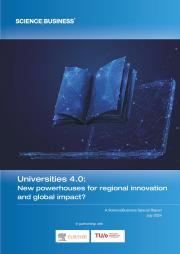This special report, sponsored by Elsevier, examines the evolving role of universities in regional innovation ecosystems.
Get your free copy

This report examines the shift towards '4th generation universities' and their impact on innovation, partnerships and European policy strategies
The role of universities is changing rapidly as the world is faced with a long list of complex, interconnected macro trends and challenges. As policymakers seek ways to create more sustainable economies and societies, they frequently look to the worlds of research and innovation (R&I) for the human creativity, disruptive ideas and novel technologies to deliver solutions.
As global issues translate into local contexts –a more tailored, focused approach to generate real-world impact is both fruitful and needed. In recent years, the concept of regional innovation ecosystems (RIE) has come to the fore as a means to achieve this. Driven by policy initiatives, such as the EU’s smart specialisation strategy, and supported by various funding instruments, RIEs bring together diverse public and private sector actors around a common agenda and objectives, seeking to translate research knowledge into innovation that improves citizens’ lives, boosts competitiveness and inspires growth.
Historically, universities have made valuable contributions to these ecosystems through knowledge creation and skills development across different scientific and technological domains – the core attributes of the so-called “3rd generation university”. Yet as the scale of challenge for policymakers shifts from problem resolution to systems-level transformation and co-creation, there is pressure on universities to evolve in parallel, moving towards what some are already calling the “4th generation university”.
In this context, it is an ideal time to rethink RIE models and the roles of different actors within them. Given the breadth and scope of their activities, universities are uniquely equipped to be in the vanguard – not only as knowledge partners for governments, industry and other stakeholders, but also as diffusers of innovation and talent into global research systems and value chains.
The EU will soon begin deliberations for its next multi-year budget and strategy (2028-2035). Against this backdrop, could the 4th generation university concept inspire new approaches within the successors to Horizon Europe, Erasmus+ and Regional Development Fund, among others? And at the macro level, what role for RIEs and universities in boosting Europe’s longer-term interests around industrial competitiveness, the green and digital transitions, quality of life and jobs, and regional sustainability?
On June 5th, 2024, Science|Business, in partnership with Elsevier and TU Eindhoven, convened a select group of senior figures and experts from across the R&I spectrum and university community to address these topics. Participants discussed the distinctive characteristics of a 4th generation university and how transitioning to this status impacts partnerships within the RIE system. They also delved into the challenges of defining and measuring value creation across borders and striking a balance between universities’ local impact and their contributions beyond the scientific community.
In partnership with:


 A unique international forum for public research organisations and companies to connect their external engagement with strategic interests around their R&D system.
A unique international forum for public research organisations and companies to connect their external engagement with strategic interests around their R&D system.